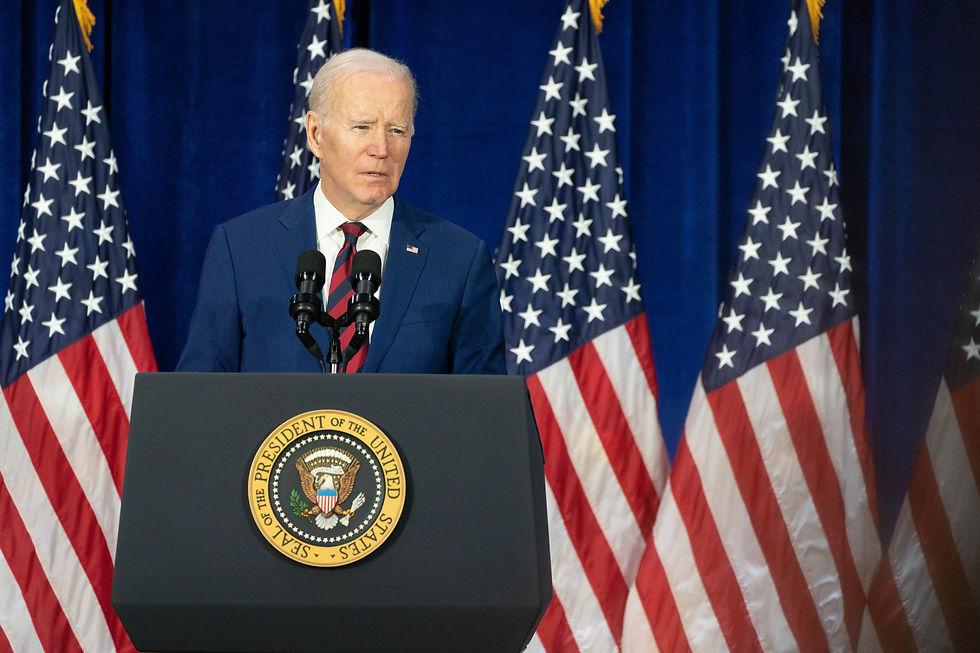New budget request aims to make education more affordable
- isaacdektor
- Mar 22, 2023
- 2 min read
President Joe Biden released the 2024 fiscal year budget request.
By Jasmine Alejandre, Staff Writer

President Joe Biden released his budget request for the 2024 fiscal year earlier this month, which includes lowering costs for students attending college.
The move is the latest in a series of efforts made by the Biden administration to help with college affordability. Just last year, he announced a three-part plan to help students with debt relief. The plan includes canceling up to $10,000 in student loans and up to $20,000 for Pell Grant recipients. The budget awaits congressional approval.
“I think it’s a fine plan, it’s coming out of the taxpayers money, but it’s education so it’s worth it,” said Larissa Vasquez, psychology major. “We spend so much more money on defense than education, so it would be better to spend it on education.”
One section of the budget request, entitled ”Lowering Costs and Giving Families More Breathing Room,” details a plan to help low and middle income students overcome financial obstacles. It includes a proposal to provide students two years of free community college if they are enrolled in a program that leads to a four-year degree or a good paying job. This is similar to California’s Promise Program, which offers first time college students two years of free college.
The budget also calls for an expansion of the Pell Grant award, which is a grant awarded to low income students to promote access to a post secondary education. The president proposed to increase the maximum Pell Grant to $8,215 for the 2024-25 award year, which is a 7 percent increase from the current $7,395.
In addition to these requests, the budget would cover two years of tuition for those who earn less than $125,000 and are enrolled in a four-year historically Black university , tribally controlled college or minority-serving institution . The request also would increase funding to these schools by $429 million.
The budget also proposed funding for TRIO, a program to support low income and first generation students. This program could receive up to $106.8 million more than the 2023 level.
“My hope is that these proposals will be approved in order for the country’s educational system to become more inclusive,” said Vernon Bridges, financial aid manager at Valley College. “And enticing to those who want to go to college but simply can’t afford to or for whatever reason do not have enough resources to both attend school and maintain their households and families at the same time.”




谷歌蜘蛛池搭建
谷歌快排
谷歌外链代发
谷歌留痕
谷歌蜘蛛池出租
谷歌快速排名
海外引流渠道
Telegram搜索引擎排名
巴西引流软件
谷歌霸屏技术
谷歌外推软件
四方支付系统
四方支付源码系统
四方支付系统源码
四方支付程序
四方支付平台源码
四方支付系统搭建
四方支付程序
四方支付平台搭建
四方支付系统源码系统
四方支付系统源码
go语言四方支付
四方支付系统源码2025
四方支付
四方支付系统
谷歌蜘蛛池搭建谷歌蜘蛛池搭建
谷歌快排谷歌快排
谷歌外链代发谷歌外链代发
谷歌留痕谷歌留痕
谷歌蜘蛛池出租谷歌蜘蛛池出租
谷歌快速排名谷歌快速排名
海外引流渠道海外引流渠道
Telegram搜索引擎排名Telegram搜索引擎排名
巴西App推广引流 巴西引流软件
谷歌霸屏 谷歌霸屏技术
谷歌外推软件谷歌外推软件
四方支付系统四方支付系统
四方支付源码系统四方支付源码系统
四方支付系统源码四方支付系统源码
四方支付程序四方支付程序
四方支付平台源码四方支付平台源码
四方支付系统搭建四方支付系统搭建
四方支付程序四方支付程序
谷歌快排谷歌快排
四方支付平台搭建四方支付平台搭建
谷歌蜘蛛池搭建谷歌快排
谷歌蜘蛛池搭建技术谷歌蜘蛛池
四方支付系统源码系统四方支付系统源码系统
谷歌快排谷歌快排是怎么做的
谷歌快排谷歌快速排名
谷歌外链代发如何发布谷歌外链
谷歌霸屏谷歌霸屏技术
四方支付系统源码golangpay
go语言四方支付go语言支付系统
四方支付系统源码2025四方支付系统源码2025
四方支付四方支付系统源码2025
谷歌蜘蛛池搭建谷歌蜘蛛池搭建
谷歌快排谷歌快排
谷歌外链代发谷歌外链代发
谷歌留痕谷歌留痕
谷歌蜘蛛池出租谷歌蜘蛛池出租
谷歌快速排名谷歌快速排名
海外引流渠道海外引流渠道
Telegram搜索引擎排名Telegram搜索引擎排名
巴西App推广引流 巴西引流软件
谷歌霸屏 谷歌霸屏技术
谷歌外推软件谷歌外推软件
四方支付系统四方支付系统
四方支付源码系统四方支付源码系统
四方支付系统源码四方支付系统源码
四方支付程序四方支付程序
四方支付平台源码四方支付平台源码
四方支付系统搭建四方支付系统搭建
四方支付程序四方支付程序
谷歌快排谷歌快排
四方支付平台搭建四方支付平台搭建
谷歌蜘蛛池搭建谷歌快排
谷歌蜘蛛池搭建技术谷歌蜘蛛池
四方支付系统源码系统四方支付系统源码系统
谷歌快排谷歌快排是怎么做的
谷歌快排谷歌快速排名
谷歌外链代发如何发布谷歌外链
谷歌霸屏谷歌霸屏技术
四方支付系统源码golangpay
go语言四方支付go语言支付系统
四方支付系统源码2025四方支付系统源码2025
四方支付四方支付系统源码2025
AV在线看 AV在线看;
自拍流出 自拍流出;
国产视频 国产视频;
日本无码 日本无码;
动漫肉番 动漫肉番;
吃瓜专区 吃瓜专区;
SM调教 SM调教;
ASMR ASMR;
国产探花 国产探花;
强奸乱伦 强奸乱伦;
AV在线看 AV在线看;
自拍流出 自拍流出;
国产视频 国产视频;
日本无码 日本无码;
动漫肉番 动漫肉番;
吃瓜专区 吃瓜专区;
SM调教 SM调教;
ASMR ASMR;
国产探花 国产探花;
强奸乱伦 强奸乱伦;